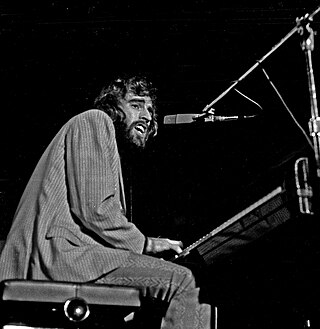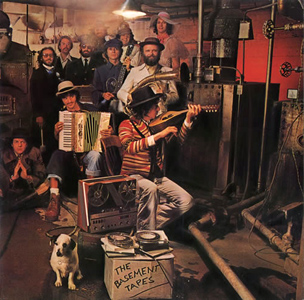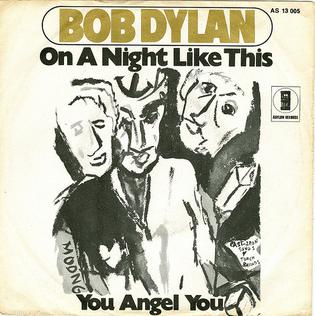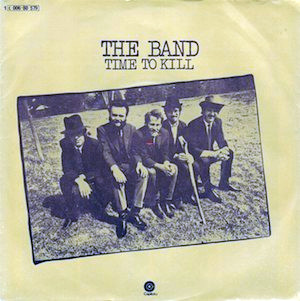Related Research Articles

The Band was a Canadian-American rock band formed in Toronto, Ontario, in 1967. It consisted of Canadians Rick Danko, Garth Hudson, Richard Manuel, Robbie Robertson, and American Levon Helm. The Band combined elements of Americana, folk, rock, jazz, country, and R&B, influencing musicians such as George Harrison, Elton John, the Grateful Dead, Eric Clapton and Wilco.

Music from Big Pink is the debut studio album by the Band. Released in 1968, it employs a distinctive blend of country, rock, folk, classical, R&B, blues, and soul. The music was composed partly in "Big Pink", a house shared by bassist/singer Rick Danko, pianist/singer Richard Manuel and organist Garth Hudson in West Saugerties, New York. The album itself was recorded in studios in New York and Los Angeles in 1968, and followed the band's backing of Bob Dylan on his 1966 tour and time spent together in upstate New York recording material that was officially released in 1975 as The Basement Tapes, also with Dylan. The cover artwork is a painting by Dylan.

Richard George Manuel was a Canadian musician, singer, and songwriter, best known as a pianist and one of three lead singers in The Band, for which he was posthumously inducted into the Rock and Roll Hall of Fame in 1994.

Jericho is the eighth studio album by Canadian-American rock group the Band. Coming seventeen years after their "farewell concert", it was released in 1993 and was the first album to feature the latter-day configuration of the group, as well as their first release for the Rhino subsidiary Pyramid Records.

The Basement Tapes is the sixteenth album by American singer-songwriter Bob Dylan and his second with the Band. It was released on June 26, 1975, by Columbia Records. Two-thirds of the album's 24 tracks feature Dylan on lead vocals backed by the Band, and were recorded in 1967, eight years before the album's release, in the lapse between the recording and subsequent release of Blonde on Blonde and John Wesley Harding, during sessions that began at Dylan's house in Woodstock, New York, then moved to the basement of Big Pink. While most of these had appeared on bootleg albums, The Basement Tapes marked their first official release. The remaining eight songs, all previously unavailable, feature the Band without Dylan and were recorded between 1967 and 1975.
"Acadian Driftwood" is a song by the Band. It was the fourth track on their sixth studio album Northern Lights – Southern Cross (1975), written by member Robbie Robertson. Richard Manuel, Levon Helm and Rick Danko trade off lead vocals and harmonize on the chorus.

"Stage Fright" is the title track of the Band's third album, Stage Fright. It features Rick Danko on lead vocals and was written by Robbie Robertson. According to author Barney Hoskyns, Robertson originally intended it to be sung by Richard Manuel but it became clear that the song was better suited to Danko's "nervous, tremulous voice."
"It Makes No Difference" is a song written by Robbie Robertson and sung by Rick Danko that was first released by The Band on their 1975 album Northern Lights – Southern Cross. It has also appeared on live and compilation albums, including the soundtrack to the film The Last Waltz. Among the artists that have covered the song are Solomon Burke, My Morning Jacket, Trey Anastasio and Over the Rhine.

"On a Night Like This" is a song written by Bob Dylan and recorded in November 1973. It first appeared on Dylan's 14th studio album, Planet Waves, as the opening track. It was also released as the lead single from the album and reached #44 on the Billboard Hot 100 The song later appeared on several Dylan compilation albums including Biograph, in 1985, and Dylan, in 2007.

"Rag Mama Rag" is a song by The Band which was first released on their 1969 album The Band. It was also released as a single, reaching #16 on the UK Singles Chart, the highest position for any single by the group. The single was less successful in the US, reaching only #57 on the Billboard Hot 100.
"Sleeping" is a song by The Band, first released on their 1970 album Stage Fright. It was also released as the B-side to the "Stage Fright" single. It was co-written by Robbie Robertson and Richard Manuel. This and “Just Another Whistle Stop” are the only two songs Manuel receives credit for on the album. Music critic Barney Hoskyns rates it as "one of Richard [Manuel's] liveliest performances" and "one of The Band's most intricate arrangements." The Band never featured the song on a live album.
"Daniel and the Sacred Harp" is a song written by Robbie Robertson that was first released by The Band on their 1970 album Stage Fright. It has been covered by such artists as Barrence Whitfield.

"Whispering Pines" is a song written by Richard Manuel and Robbie Robertson that was first released by The Band on their self-titled 1969 album The Band. It was released as a single in France, backed by "Lonesome Suzie".

"Ophelia" is a song written by Robbie Robertson that was first released by The Band on their 1975 album Northern Lights – Southern Cross. It was the lead single from the album. It has also appeared on several of the group's live and compilation albums, and has been covered by such artists as Vince Gill and My Morning Jacket.

"Time to Kill" is a song written by Robbie Robertson that was first released by the Band on their 1970 album Stage Fright. It was also released as a single off the album, backed with the more famous "The Shape I'm In" and, although it failed to reach the Top 40 in the United States, it peaked at #13 in the Netherlands. It has also been featured on several Band compilation and live albums.
"Jemima Surrender" is a song written by Levon Helm and Robbie Robertson. It was first released on the Band's self-titled album in 1969. Usual Band drummer Levon Helm played guitar and sang the lead vocal while usual Band pianist Richard Manuel played drums. The song's lasciviousness helped inspire Naomi Weisstein to form the Chicago Women's Liberation Rock Band.
"The W.S. Walcott Medicine Show" is a song written by Robbie Robertson that was first released on the Band's 1970 album Stage Fright. It was also frequently performed in the group's live sets and appeared on several of their live albums. Based on Levon Helm's memories of minstrel and medicine shows in Arkansas, the song has been interpreted as an allegory on the music business. Garth Hudson received particular praise for his tenor saxophone playing on the song.
"The Unfaithful Servant" or "Unfaithful Servant" is a song written by Robbie Robertson that was first released by The Band on their 1969 album The Band. It was also released as the B-side of the group's "Rag Mama Rag" single. It has also appeared on several of the Band's live and compilation albums.
"4% Pantomime" is a song written by Robbie Robertson and Van Morrison. It was first released on the Band's 1971 album Cahoots.
References
- 1 2 3 Ward, T. "When You Awake". Allmusic . Retrieved 2015-05-25.
- 1 2 3 4 5 6 7 Hoskyns, B. (2006). Across the Great Divide: The Band and America. Hal Leonard. ASIN B001C4QHK0.
- 1 2 3 4 5 6 7 8 9 10 11 DeRiso, N. (3 October 2013). "Across the Great Divide: The Band, "When You Awake" from The Band (1969)". Something Else!. Retrieved 2015-05-25.
- 1 2 3 4 5 6 7 8 9 Viney, P. "When You Awake". The Band. Retrieved 2015-05-25.
- 1 2 Harris, C. (2014). The Band. Rowman & Littlefield. pp. 59, 97–98. ISBN 9780810889040.
- 1 2 3 4 5 Classic Albums-The Band. Eagle Rock Entertainment. 2005.
- ↑ Campbell, M. (October 25, 1969). "'Abbey Road' Is Another Terrific Beatles Disc". The Free Lance-Star . p. 10. Retrieved 2015-05-26.
- ↑ "Richard Manuel Found Dead". Billboard Magazine . March 15, 1986. p. 10. Retrieved 2015-05-25.
- ↑ "Band Bassist/Vocalist Danko Dies". Billboard Magazine . December 25, 1999. pp. 7, 83. Retrieved 2015-05-25.
- ↑ Ruhlmann, W. "The Best of the Band [Bonus Tracks]". Allmusic . Retrieved 2015-05-25.
- ↑ Erlewine, S.T. "A Musical History". Allmusic . Retrieved 2015-05-25.
- ↑ Helm, L. & Davis, S. (2013). This Wheel's on Fire: Levon Helm and the Story of The Band . Chicago Review Press. p. 216. ISBN 9781613748763.
{{cite book}}: CS1 maint: multiple names: authors list (link) - ↑ Marcus, G. (2015). Mystery Train: Images of America in Rock 'n' Roll Music (6th ed.). Penguin. pp. 51, 54. ISBN 9780698166684.
- ↑ Nogowski, J. (2008). Bob Dylan: A Descriptive, Critical Discography and Filmography, 1961-2007 (2nd ed.). McFarland. p. 65. ISBN 9780786435180.